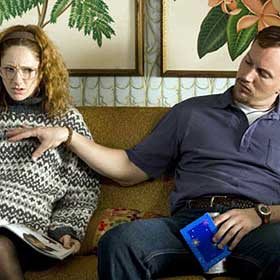Barry Munday

3/5
While contributing to a particularly overplayed and uninspired genre, Chris D’Arienzo’s directorial debut, Barry Munday, takes a slightly darker, wittier, and fresher spin on the stale world on the romcom. The characters are more grotesque and, by definition, more realistic. They are not super smooth or adorably dorky. They do not have glamorous jobs and sprawling lofts in Manhattan with hardwood floors and panoramic views of the skyline. They are – like most of us – deeply flawed, somewhat unattractive, and not nearly as smart as they think they are. They still turn out to be likable and charming enough to convince us there’s a reason to keep watching, albeit not a compelling one.
Barry Munday’s protagonist, the title character played by the versatile Patrick Wilson, is a nine-to-fiver in a dead end, lifeless office job that makes the setting of Mike Judge’s cult classic, Office Space, seem cozy. His only joy in life is imbibing massive quantities of beer at the same ol’ corporate chain Applebee’s-knock-off that infiltrates every suburban neighborhood, and going home with different women every night. Barry is a womanizer, and a successful one – not because he is stunningly gorgeous, exceptionally witty, or even passably smooth – but because he preys on the same type of intoxicated, unhappy, and … well … a little bit trashy woman night after night. All of this works for him, and he contentedly calls it a life, until his antics catch up with him one day when a young lady’s father catches Barry corrupting his little girl, and decides to do something about it, attacking him in his family jewels. Barry wakes up in a hospital room with no recollection of the incident, and also no testicles.
Fraught with pain and depression, Barry’s overturned world is again rocked when, right on cue, Ginger Farley, an unapologetically bitter and deeply insecure woman (the hilarious Judy Greer) enters his life, suing him for paternity of her unborn child. Though he isn’t the brightest, it doesn’t take Barry long to figure out that this is his last shot at starting a family, and if he is at all interested in the potentiality of fatherhood, he must find a way to cooperate with this woman on the level of partnership and make it work. Luckily for Barry, about the only people Ginger disdains more than him are her sister and parents, played with formidable heart by Chloe Sevigny, Cybill Shepherd, and the legendary Malcolm McDowell, respectively. Jean Smart rounds out this solid cast as Barry’s new-age, single mother, who is oddly portrayed as about the most sensible one in the mix. Put it all together and you have a decent film that has all the telltale signs of a romantic comedy but omits most of the unrealistic elements that make the genre so formulaic. Though it’s mostly the acting that holds up the movie, the writing can be complimented for inserting more realistic, flawed, sometimes downright appalling, characters into the usual stock roles.
The DVD offers several bonus features, including a feature-length commentary with D’Arienzo, Wilson, and Greer, interviews with the cast, a hefty gag reel featuring mainly Wilson cracking up, and outtakes. The deleted scenes, which are ample and surprisingly fun to watch, can be played with or without commentary. There is also a public service announcement called “Your Penis and You” for men with genital deformities, based on a scene from the film that shows Barry in a support group for men who have, in one way or another and to varying degrees, lost their manhood.
RELATED ARTICLES
Get the most-revealing celebrity conversations with the uInterview podcast!





Leave a comment